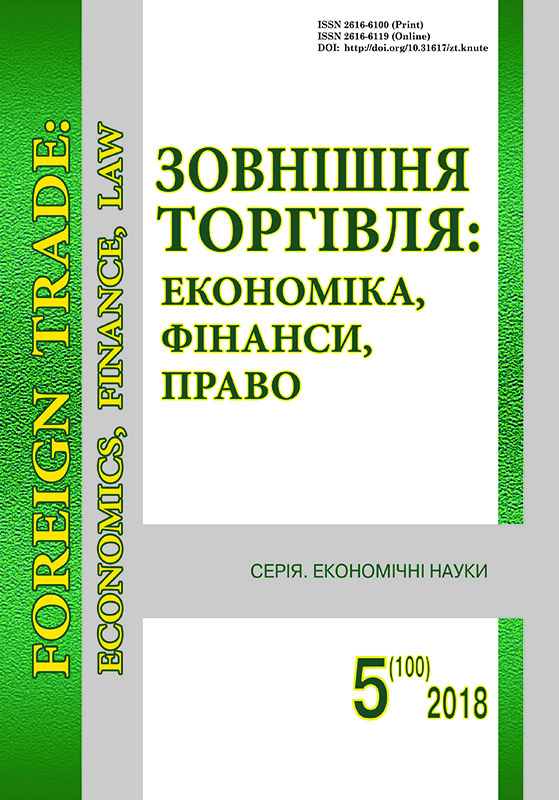Methodological discourse of international economic partnership
Keywords:
interaction, dependence, interdependence, trust, justice, partnershipAbstract
Background. The substantiation of the methodological discourse of the international economic partnership is due to the need for its consideration in the context of the theory of international economic relations, as well as the definition of the main conditions for its effectiveness.
Analysis of recent research and publications. On the basis of the analysis of the publications of foreign and domestic experts the relevance of the development of methodological discourse of the international economic partnership is determined.
The aim of the article is the methodological substantiation of the concept of «international economic partnership» as a form of interaction between subjects of international economic relations and factors that form its effectiveness.
Materials and methods. Research materials were provided by the works of domestic and foreign specialists.
Results. It is shown that the methodological discourse of the problem of international partnership is determined by the essence of economic and political interaction of subjects of international relations. It is determined that fairness of relationships and trust between potential partners are necessary conditions for effective partnership. International partnership can be considered as the fair one if partners’ strategies are based on rules that are recognized by international law irrespective of the results of the partnership agreement and are voluntarily ratified by its parties. It is proposed to rely on the methodology of equilibrium theory for assessing the equity of the partnership and on a set of global indexes – for assessing the credibility of the country by the international community.
Conclusion. Problems of international partnership are in the methodological plane of the researching of interaction of subjects of international relations. The partnership is a product of the dependence and interdependence of international actors, based on a consensus paradigm for reconciling their economic interests.
References
Reznikova, N. (2013). Global'na ekonomichna vzajemozalezhnist': suchasna paradygma ta determinanty modyfikacii' [Global economic interdependence: a modern paradigm and determinants of modification]. Кyiv : VISTKA [in Ukrainian].
Gorbulin, V. Kryza doviry: u poshuku novogo fundamentu stijkyh al'jansiv [Confidence crisis: in search of a new foundation for lasting alliances]. Retrieved from https://dt.ua/internal/kriza-doviri-u-poshukah-novogo-fundamentu-stiykih-alyansiv-272302_.html [in Ukrainian].
Rzhevs'ka, N. (2013). Strategichne partnerstvo Ukrai'na SShA – stan ta prognoz [Strategic partnership, Ukraine United States – state and forecast]. Politychnyj menedzhment – Political management, 1-2. 226-233 [in Ukrainian].
Fesenko, M. (2015). Global'ne strategichne partnerstvo providnyh aktoriv: teoretyko-metodologichnyj vymir [Global strategic partnership of leading actors: theoretical and methodological dimension]. Visn. KNU im. T. Shevchenka – Herald of the Taras Shevchenko National University of Kyiv, 1 (43). 24-29 [in Ukrainian].
Hodzhajan, A. O. (2017). Strategichne partnerstvo jak forma mizhnarodnogo spivrobitnyctva [Strategic partnership as a form of international cooperation]. Nauk. visn. Polissja – Scientific Herald of Polissia, 3. 48-53 [in Ukrainian].
Sen, A. Svoboda, edinoglasie i prava [Freedom, Unanimity, and Rights]. Retrieved from http://www.seinstitute.ru/Files/veh4-1-6_Sen_p195-248.pdf [in Russian].
Shlezinger, A. (1992). Cikly amerikanskoj istorii [American History Cycles]. Мoscow : Progress-Akademija [in Russian].
Blaug, M. (2004). Metodologija jekonomicheskoj nauki, ili kak jekonomisty ob’jasnjajut [Methodology of economics or how economists explain]. Voprosy jekonomiki – Issues of economics [in Russian].
Olson, M. (1995). Logika kollektivnyh dejstvij. Obshhestvennye blaga i teorija grupp [The logic of collective actions. Public goods and group theory] ; per. s angl. Мoscow : FJeI [in Russian].
Shvab, K. (2016). Chetvertaja promyshlennaja revoljucija [Chetvertaja promyshlennaja revoljucija]. Moscow: Jeksmo [in Russian].
Hajek, F. (2006). Pravo, zakonodatel'stvo i svoboda: Sovremennoe ponimanie liberal'nyh principov spravedlivosti i politiki [Law, legislation and freedom: a modern understanding of the liberal principles of justice and politics] ; per. s angl. Moscow : IRISJeN [in Russian].
Sen, A. (2016). Ideja spravedlivosti [Idea of justice]. Мoscow : Izd-vo In-ta Gajdara, [in Russian].
Fukujama, F. (2004). Doverie: social'nye dobrodeteli i put' k procvetaniju [Trust: social virtues and the way to prosperity]. Мoscow : AST [in Russian].
Harlamova, G., & Iskra, A. (2015). Ocinka stupenja globalizovanosti krai'ny v aspekti procesiv konvergencii' ta integracii' u sviti [Assessment of the degree of country globalization in terms of convergence processes and integration in the world]. Visn. KNU im. T. Shevchenka – Herald of the Taras Shevchenko National University of Kyiv, 6 (171). 65-73 [in Ukrainian].
Stuchyns'ka, N. P. (2017). Riven' globalizacii': kil'kisne obg'runtuvannja jakisnyh transformacij. Investycii': praktyka ta dosvid [The level of globalization: quantitative justification for qualitative transformations. Investments: practice and experience], 100-105 [in Ukrainian].
Rejting stran mira po urovnju slabosti gosudarstva [Rating of the world countries by the level of state weakness] (Failed states Index). Retrieved from https://gtmarket.ru/ratings/failed-states-index/info [in Russian].
Tokvil', Al. (2008). Staryj porjadok i revoljucija [Old order and revolution]. Saint Petersburg: ALETEJa [in Russian].



